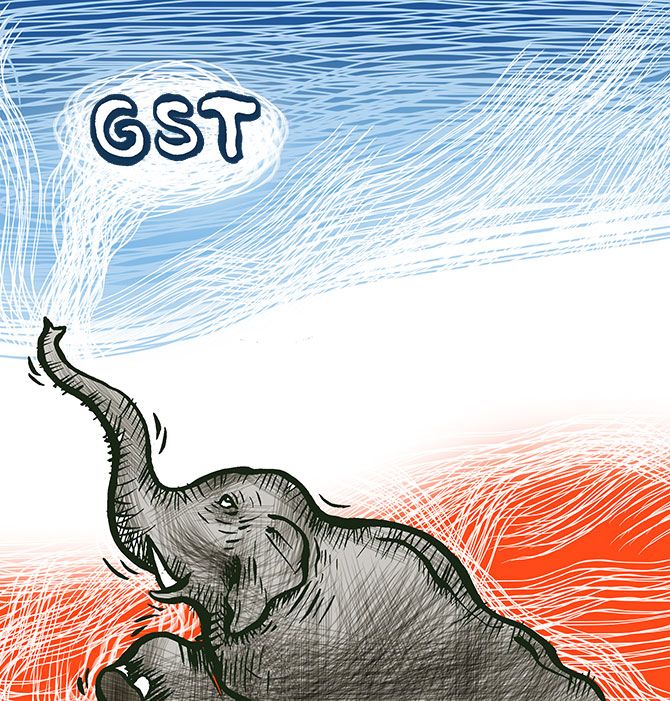The new restriction will be challenging for businesses, as they will have to do regular follow-ups with their suppliers.
Illustration: Dominic Xavier/Rediff.com

Industry fears that the Goods and Services Tax (GST) Council’s decision to further restrict input tax credit (ITC) on invoices not uploaded in the relevant form would block the cash flow of businesses, says the latter, at a time when they’re struggling on finances due to economic slowdown.
On Wednesday, the Council approved a proposal to restrict ITC to 10 per cent of eligible credit, against the current 20 per cent, for such invoices.
The mechanism works this way: Suppose you paid Rs 1,000 as taxes to your suppliers and claimed this as ITC on your summary input-output form, GSTR 3B.
You have to also ensure all your suppliers upload these invoices in their supply-side return, GSTR 2A.
Now, if invoices amounting to 20 per cent of the ITC claimed are not so uploaded by your vendors, then your eligible credit would be only Rs 800.
You can claim further ITC of Rs 80 (10 per cent of Rs 800) after the GST Council’s decision is notified.
Earlier, you could have done so for Rs 160.
In fact, before October, whatever was claimed as ITC in GSTR 3B, was being released by the authorities.
In October, the government restricted this to 20 per cent of eligible credit. And, now, to 10 per cent.
Archit Gupta, chief executive at fintech service platform ClearTax, says the new restriction will be challenging for businesses.
"They will have to do regular follow-ups with their suppliers." M S Mani, partner at consultants Deloitte India, said the restrictions on ITC increase the blockages of working capital.
Rule 36 (4) under the Central GST Act, which enables such restrictions, is already under challenge at the Delhi high court.
"Businesses would welcome the elimination of such restrictions which are not in consonance with key GST principles which mandate seamless credits across the value chain," said Mani.
Abhishek Rastogi, partner at Khaitan & Co., said the restriction on credits due to the fault of the vendors will have to cross the constitutional test.
"Further, even the percentage of either 10 or 20 per cent is not based on any logic and hence is completely arbitrary," he said.
Harpreet Singh, partner at consultancy KPMG. He says many multinational companies have completely forgone the 20 per cent or 10 per cent credit, on account of the hassle of month-on-month reconciling of credit.
Abhishek Jain, tax partner at consultancy EY, says the new restrictions are due to falling tax collections and to plug fraudulent credits.
"It is imperative for businesses to ensure timely credit reconciliation, including follow-up with vendors, timely correction and maintaining of adequate date for the said compliance.
"Wherever proper reconciliations are not done, it may lead to cash flow issues,” he said.
Gupta of ClearTax feels further reduction in credit could have been considered later, with the new return filing process.
In the latter, there is the concept of invoice matching - ITC cannot be claimed on invoices not reconciled.
These returns would come into effect from April 1.












 © 2025
© 2025